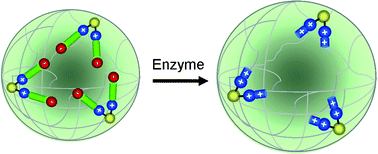Branched peptide actuators for enzyme responsive hydrogel particles†
Abstract
We demonstrate the preparation of

* Corresponding authors
a Manchester Materials Science Centre, University of Manchester, Grosvenor Street, Manchester, UK
b Manchester Interdisciplinary Biocentre, The University of Manchester, 131 Princess Street, Manchester, UK
c
WestCHEM/Department of Pure & Applied Chemistry, Thomas Graham Building, 295 Cathedral Street, Glasgow, UK
E-mail:
Rein.Ulijn@strath.ac.uk
Fax: +44 141 548 4822
Tel: +44 141 548 2110
We demonstrate the preparation of

 Please wait while we load your content...
Something went wrong. Try again?
Please wait while we load your content...
Something went wrong. Try again?
T. O. McDonald, H. Qu, B. R. Saunders and R. V. Ulijn, Soft Matter, 2009, 5, 1728 DOI: 10.1039/B818174H
To request permission to reproduce material from this article, please go to the Copyright Clearance Center request page.
If you are an author contributing to an RSC publication, you do not need to request permission provided correct acknowledgement is given.
If you are the author of this article, you do not need to request permission to reproduce figures and diagrams provided correct acknowledgement is given. If you want to reproduce the whole article in a third-party publication (excluding your thesis/dissertation for which permission is not required) please go to the Copyright Clearance Center request page.
Read more about how to correctly acknowledge RSC content.
 Fetching data from CrossRef.
Fetching data from CrossRef.
This may take some time to load.
Loading related content
